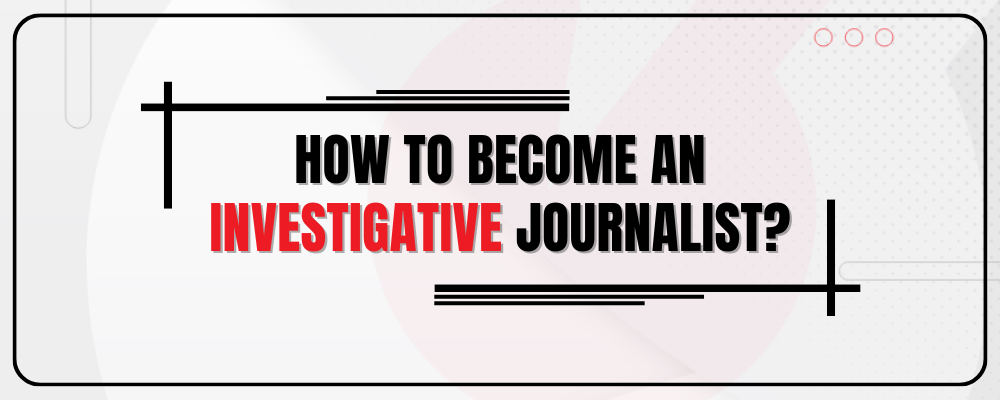Investigative journalism plays a crucial role in uncovering hidden truths, holding those in power accountable, and bringing important issues to light. If you have a passion for seeking the truth and a desire to make a difference, becoming an investigative journalist could be an exciting and rewarding career path for you.
In this article, we will guide you through the steps to become an investigative journalist.
So let go…
Define Investigative Journalist in Simple Language
An investigative journalist is a professional who goes beyond the surface-level reporting and delves deep into issues, conduct thorough research, interview sources, analyze data, and often work on long-term projects to provide in-depth and impactful reports that can bring about change.
According to Bob Edward, an investigative journalist, “An investigative journalist is like a detective. They dig deep, follow leads, and connect the dots to uncover hidden truths.”
Steps to Become an Investigative Journalist
- Develop a Solid Foundation in Journalism
Begin by gaining a strong understanding of journalism fundamentals. Pursue a degree in journalism or a related field, or consider taking journalism courses or workshops to learn about news writing, reporting, ethics, and investigative techniques. Building a solid foundation will equip you with the necessary skills and knowledge.
- Hone Your Research Skills
Investigative journalism requires extensive research. Learn how to navigate various sources, including public records, government documents, academic journals, and online databases. Develop effective research strategies, learn how to verify information, and practice analyzing data to uncover hidden patterns or inconsistencies.
As experienced reporter Alex Bennett says, “Investigative journalism demands meticulous research, where every piece of information is scrutinized. It’s about being the Sherlock Holmes of journalism, examining evidence, and connecting it in a way that reveals the bigger picture.”
- Cultivate Strong Interviewing Skills
Interviewing is a crucial aspect of investigative journalism. Learn how to conduct in-depth interviews, ask probing questions, and gain the trust of your sources. Practice active listening and develop the ability to extract valuable information from reluctant or cautious individuals.
- Master the Art of Storytelling
Investigative journalism is about more than just presenting facts; it requires engaging storytelling to captivate and inform your audience. Develop your writing skills, learn how to structure narratives, and practice presenting complex information in a clear and compelling manner.
- Embrace Digital Tools and Technology
Learn how to use data visualization techniques, data mining softwares, and digital research tools. Familiarize yourself with social media platforms, online databases, and multimedia storytelling techniques to enhance the impact of your investigations.
- Build a Network of Contacts
Developing a strong network of contacts is invaluable in investigative journalism. Cultivate relationships with experts, whistleblowers, insiders, and other journalists. Attend journalism conferences, join professional organizations, and participate in industry events to expand your network and access valuable sources of information.
- Start Small and Gain Experience
Begin by tackling smaller investigative projects and gradually work your way up. Gain experience by freelancing, interning, or working for local news outlets or investigative journalism organizations. As you build a portfolio of impactful investigations, you’ll enhance your credibility and increase your chances of taking on larger projects.
Skills Required to Become an Investigative Journalist
- Curiosity: A strong desire to uncover the truth and dig deeper into issues.
- Critical Thinking: The ability to analyze information, identify patterns, and draw insightful conclusions.
- Persistence: Investigative journalism often requires long-term commitment and the determination to overcome obstacles.
- Ethical Integrity: Upholding high ethical standards, maintaining objectivity, and ensuring accuracy in reporting.
- Communication: Excellent written and verbal communication skills are crucial for conveying complex information effectively.
- Adaptability: The ability to navigate through different subject areas and quickly grasp new concepts.
- Attention to Detail: Being meticulous in research and fact-checking is essential to ensure accuracy in investigative reporting.
- Interviewing: Proficiency in conducting interviews, gaining trust, and eliciting valuable information from sources.
- Data Analysis: Skills in collecting, analyzing, and interpreting data to uncover meaningful insights and patterns.
- Digital Literacy: Familiarity with digital tools, online databases, data visualization, and multimedia storytelling techniques.
- Time Management: Effective organization and time management skills to handle long-term investigative projects with deadlines.
- Resilience: The ability to handle challenging situations, deal with setbacks, and persist in the face of adversity.
Responsibilities of Investigative Journalists
- In-depth Research: Conducting thorough research to uncover hidden information, facts, and evidence.
- Fact-checking: Verifying the accuracy of information and ensuring that all claims are supported by reliable sources.
- Protection of Sources: Safeguarding the anonymity and confidentiality of sources who provide sensitive information.
- Ethical Reporting: Adhering to ethical guidelines, maintaining objectivity, and avoiding conflicts of interest.
- Unbiased Reporting: Presenting information in a fair and balanced manner, without personal bias or agenda.
- Public Accountability: Holding those in power accountable for their actions and shedding light on societal issues.
- Impactful Storytelling: Crafting compelling narratives that engage and inform the audience, aiming to inspire change.
Finding a Job as an Investigative Journalist
- Research News Organizations: Identify reputable news organizations with a focus on investigative journalism.
- Network: Connect with professionals in the field, attend industry events, and join journalism organizations to expand your network.
- Internships and Fellowships: Seek out internship or fellowship opportunities that focus on investigative reporting.
- Freelancing: Consider freelancing to gain experience and build a portfolio of investigative work.
- Online Platforms: Utilize online platforms specifically designed for journalists to find job listings and connect with potential employers.
- Create a Portfolio: Develop a comprehensive portfolio showcasing your investigative work, including published articles, reports, and multimedia projects.
Earnings of Investigative Journalists
Based on the data from salary.com, the median annual salary for Investigative Reporters in the United States is approximately $67,344 as of May 01, 2023. However, actual earnings can vary depending on factors such as experience and the size of the organization, with salaries typically ranging between $54,014 and $88,813.
Does an Investigative Journalist Require a Degree?
A degree in journalism can provide a solid foundation, it is not a strict requirement to become an investigative journalist. Practical experience, a strong portfolio, and honed skills are equally important. However, a degree can offer valuable knowledge that can benefit your career.
A freelance journalist, Olivia Foster, clearly explains this, “While a degree in journalism can be advantageous, it is not the sole path to becoming an investigative journalist. What matters most is cultivating the skills of persistence, critical thinking, and storytelling. Investigative reporting is about tenacity and uncovering the truth, whether you have a degree or not.”
Conclusion
Becoming an investigative journalist requires a combination of skills, dedication, and passion. By following the above steps, you can begin your fulfilling your career as an investigative journalist.






